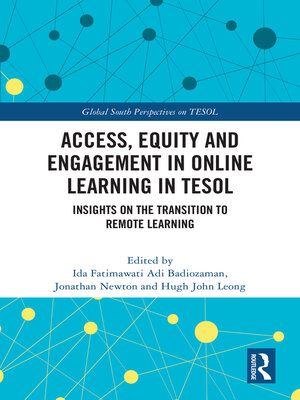Access, Equity and Engagement in Online Learning in TESOL
ebook ∣ Insights on the Transition to Remote Learning · Global South Perspectives on TESOL
By Ida Fatimawati Adi Badiozaman

Sign up to save your library
With an OverDrive account, you can save your favorite libraries for at-a-glance information about availability. Find out more about OverDrive accounts.
Find this title in Libby, the library reading app by OverDrive.



Search for a digital library with this title
Title found at these libraries:
| Library Name | Distance |
|---|---|
| Loading... |
This volume explores difficulties facing TESOL education's transition to online learning in the Global South and Southeast Asia/Asia Pacific region, highlighting innovations of educators in engaging learners, thereby exploring the key themes of access, engagement, and equity in the field.
Discussing themes such as academic burnout, cultural competence, and emotional regulation strategies in challenging educational contexts, this novel volume gives voice to field experiences encountered in countries such as Malaysia, Indonesia, Oman, Vietnam, China, and Iran. Chapters demonstrate how a lack of access to reliable internet connectivity and a shortage of digital devices, especially in rural areas, compound limited opportunities for students already facing educational inequalities, presenting the innovative and creative ways English educators are responding to these situations. Across interviews and qualitative studies, the book demonstrates that issues surrounding engagement with, access to, and equity within, the remote and online educational context are wider and longer lasting than the recent pandemic period itself and are at the forefront of challenges facing these regions today.
Highlighting English educators' resilience, perseverance, and creativity in challenging circumstances, the book will be of interest to researchers, scholars, and postgraduate students in open and distance education, eLearning, bilingualism/ESL, and distribution of technology in educational settings.







